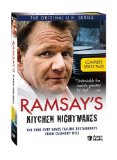| Reviews & Columns |
|
Reviews DVD TV on DVD Blu-ray 4K UHD International DVDs In Theaters Reviews by Studio Video Games Features Collector Series DVDs Easter Egg Database Interviews DVD Talk Radio Feature Articles Columns Anime Talk DVD Savant Horror DVDs The M.O.D. Squad Art House HD Talk Silent DVD
|
DVD Talk Forum |
|
|
| Resources |
|
DVD Price Search Customer Service #'s RCE Info Links |
|
Columns
|
|
|
Ramsay's Kitchen Nightmares: Complete Series Two - The Original U.K. Series
"And the torturous treatment of innocent food doesn't stop there...."
"It seems my super-basic menu isn't basic enough for this team of numbskulls."
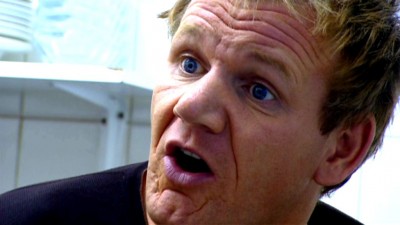
Acorn Media has released Ramsay's Kitchen Nightmares: Complete Series Two, a three-disc, 10-episode gathering of foul-mouthed, passionate British TV chef's Ramsay's 2005 season (although...the episodes listed here don't quite seem to match up with the original 2005 U.K. airing dates). These episodes have been re-run ad nauseam on BBC America here in the States, but die-hard fans of F-word-spewing Gordon certainly will want to add these bleep-free editions to their DVD collections. No extras to speak of, though, which is a bit of a cock-up on the catering front, but the transfers are excellent and the increase in episodes from Series One is welcome.
I've written before about Gordon Ramsay (I'm an admitted fan) and Kitchen Nightmares for my review of the series' first season (they use "series" for "season" in BritTV-speak), so I wont' go into too much background detail on the show. My Series One summary of Ramsay's Kitchen Nightmares describes exactly what happens in Series Two: celebrity chef Gordon Ramsay, who currently holds a total of sixteen Michelin stars for his various restaurants, visits failing U.K. restaurants and sets about diagnosing their problems. Spending a week working with the owners and the kitchen staff, Ramsay, with characteristic machismo and an unending string of expletives, first arrives at the location to sample the fare, promptly declares it dog shit, and then seeks out the people responsible, sparing them no insult - both professional and personal - until he has their attention (if the food is good - as it is with a couple of restaurants here in this Second Series, he'll find other reasons why customers aren't showing up). Typical problems identified usually boil down to too-pricey items, confused, pretentious, or outdated menus, poor-quality food (most of it pre-packaged), remarkably inept or pompous, arrogant staff (including a bevy of hapless head chefs), heavy, crushing debt, inadequately-priced items, and poorly-designed venues. Gordon lays down the law about what he wants changed with the restaurant (his advice is invariably: simplify), re-teaches the chefs how to cook, and then watches them fail miserably under pressure when the once-sleepy restaurants are besieged with new customers (after Gordon gets the owners to promote their revamped operations). Gordon yells at everyone again, bemoaning their thick heads, and tries again. But ultimately, it will be up to the owners, once Gordon leaves, to either stick with his advice and survive, or go back to their tried and tested (and failed) ways, and sink finally into bankruptcy.
If you're a devoted follower of the British tabs (my favorite Drudge links), you'll know that 2009 wasn't a particularly good year for Gordon Ramsay (these stories didn't get a lot of play here in the our now state-run media). A multitude of personal and professional problems seemed to pile up this year on the outspoken celebrity chef, all of which threatened to tarnish the multi-million pound empire he's quickly amassed over the past decade. First and foremost, Ramsay's own corporation and the restaurants he owns and supervises, have been hit hard by the world-wide economic downturn of late - eating out is always one of the first luxuries to go during a recession - as well as by the possible too-rapid expansion of his ever-burgeoning list of restaurants and other hospitality commitments. A highly-publicized allegation that he had a long-standing affair with author Sarah Symonds (and the suggestion he's had other one-offs, as well) didn't help Ramsay's family image (a potent counterweight to the more abrasive elements of his "image"), while his recent flap with Australian TV personality Tracy Grimshaw (over several days, Ramsay insulted the performer on national television, calling her a pig while holding up an obscene illustration), showed Ramsay in a most unflattering light, perhaps giving some credence to those detractors that question Ramsay's bullying ways. Perhaps worst of all, the discovery that Ramsay's Foxtrot Oscar restaurant in West London, as well as a couple of pubs he oversees, were using re-heated, pre-prepared foods - the most sacrilegious transgression a restaurant can commit, according to Ramsay in these Kitchen Nightmares episodes - rubbed fans the wrong way when confronted with even a suggestion of the chef's own hypocritical practices.
I mention all of this unsavory news - but most particularly the egregious Foxtrot Oscar scandal - because it is damn hard to like Ramsay if you don't buy that he's basically an on-the-level, square guy who fervently loves good food. If Ramsay is nothing more than a skirt-chasing bully who doesn't practice what he preaches in the kitchen, then it's difficult to watch episodes from Ramsay's Kitchen Nightmares in the same way you did a couple of years ago. After all, Ramsay's genuine commitment to food - he's morally outraged at these horrible restaurants who betray their customers' trust with awful food and unhygienic surroundings - was the overriding check in his "plus column," so to speak. The constant swearing, the humiliating put-downs he inflicted on his (deserving) victims (which are undeniably funny, but which make sense because he's truly trying to wake these sleepwalkers and cheats up), the yelling and the shouting in the dysfunctional kitchens - all of that could be chalked up to exaggeration to make himself a noticeable, viable alternative to the usually staid, sometimes comatose TV chefs that preceded him. But if fame and fortune and ever-enveloping time constraints have led him to cut corners, then he's basically no different than the boobs he rails against in his shows. And that's a drag to contemplate.
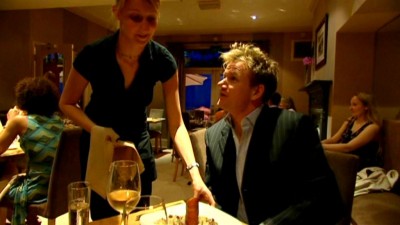
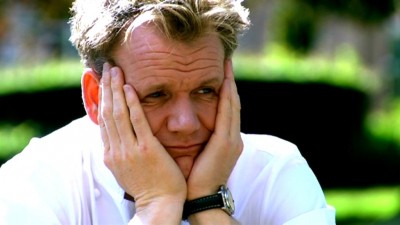
As for the episodes included on Ramsay's Kitchen Nightmares: Complete Series Two, they're on a par with the previous season's offerings. Below, I'll list the episodes included on this collection, with their brief summaries, followed by my own thoughts and observations about them (there will be spoilers, so if you haven't seen the episodes, skip down to the rest of the review).
DISC ONE
Episode 1: LANTERNA (Letchworth, Hertfordshire)
"A British chef who calls himself "Alessandro" claims to offer authentic Italian food, provoking Gordon to use another F-word: fake."
Quite a funny episode ("So far, I've seen fuck-all Italian."), particularly when Gordon gets his first taste of Alessandro's cooking (holding one of two nasty sausages aloft, Gordon gravely intones: "It looks like two poodle penises - fucking disgusting."). The head chef, Alex Scott, is a prime example of the seemingly clueless restaurateurs that Ramsay's Kitchen Nightmares exposes, chefs that we never dream are heading up our own culinary haunts. Why does Alex - sorry: "Alessandro" - buy a 46,000-pound luxury car, complete with "A1Chef" vanity plates, when he's 180,000 pounds in debt? Gordon can't get his head around that one, either, but the episode's best moment comes when Alessandro defends himself by saying he was taught by Mario, his mentor and Italian chef...who turns out to be a taxi driver (and who says Alex is lousy driver, to boot). Thankfully, Alex takes Gordon's advice seriously, and when Gordon returns six weeks later, it appears Alex and his restaurant are back on track.
Episode 2: D-PLACE (Chelmsford, Essex)
"Offering fusion confusion on its menu and full-scale screaming matches between the head chef and maitre d', D-place is a real disaster."
This episode has one of the most curious chefs featured on the series: former Planet Hollywood and executive chef Phillipe Blaise. What is this guy, who used to have 150 people underneath him at P.H., doing in this backwater restaurant? It becomes clear to Gordon when he sees the total chaos in his kitchen, and the plates after plates of food brought back uneaten - Phillipe has fallen far from his heights as a chef. One the series' best awkward moments comes when Gordon catches Phillipe in an out-and-out lie about re-frying day-old, already-cooked potatoes ("There's only one thing worse than a chef who can't cook--it's a chef who tells porkies."). In an ironic ending, Phillipe survives a purge by the brewery company that holds the loan on D-place, while nice-guy-but-naive owner Israel gets canned.
Episode 3: MOMMA CHERRI'S SOUL FOOD SHACK (Brighton, East Sussex)
"The owner has personality to spare, and the head chef has talent. So why doesn't this tourist-town eatery make money?"
Not one of the more interesting episodes of the series because both the head chef Brian Mayo and the owner, Charita, can cook. We never really get a good sense of why customers aren't coming into the restaurant in the first place, so we don't see how Gordon actually helps them. He says their food is good at first, but then he discovers most of it is made beforehand and then frozen; he believes the food could be even better fresh. That's fine, but he he did like it in the first place, so.... Undeniably, these episodes are more involving when Gordon has to execute a top-to-bottom reorganization of the kitchens - including teaching chefs who should know better, how to cook.
Episode 4: MOMMA CHERRI'S SOUL FOOD SHACK/BIG HOUSE REVISITED (Brighton, East Sussex)
"Two years after his first visit, Gordon finds that the bighearted momma has moved to the Big House - with big problems."
This is one of the Kitchen Nightmares Revisited episodes that Ramsay created by tacking on ten minutes of new material to an old episode, covering his return to that restaurant. I wasn't particularly impressed with his first episode, so this return wasn't welcome, but of all the Revisited episodes I've seen, this one truly needed all-new material. Charita has moved into a spectacular multi-level restaurant, but the frozen food is back, and the signs dire that customers aren't impressed with what used to be the best rib joint in Brighton. Gordon doesn't really fix anything, and I would have liked more background on how Charita came to that beautiful new restaurant, as well as how she started slipping back into her old habits even though she seemingly had it made. An unsatisfying episode.
DISC TWO
Episode 5: LA RIVIERA (Inverness, Scotland)
"Despite the finest resources, an ambitious, superbly trained chef has failed to win over local folks with his too fancy French cuisine."
Another episode where the chef can cook, but customers just aren't coming into the restaurant. It's strange to see such a fancy restaurant, with top-of-the-line equipment and staff, featured on the show: shouldn't they just...know how to get customers to show up? Gordon's observations about the too-fussy, over-complicated, taste-clashing menu of chef Loic Lefebvre apparently come from his own failure to keep a restaurant going in Scotland. When you see Derek Brown, the ex-president of Michelin, no less, offer the exact same advice to Loic - simplify - you can just tell Loic's not listening.
Episode 6: LA RIVIERA/ABSTRACT REVISITED (Inverness, Scotland)
"With a spin-off brasserie going like gangbusters, La Riviera - newly christened as Abstract - falls back to Frankensteinian rather than Franco-Scottish creations."
Yet another Revisited episode which needed more than ten minutes to truly finish up the story and satisfy the viewer. Why the hell did the owners build a whole new brasserie, serving up the very kinds of foods that Gordon advised them to make for La Riviera, and whose success is stealing customers away from the first restaurant, when they could have just made those foods at La Riviera? And then when Gordon discovers that Loic and his investment partner Barry Larson plan on building a third restaurant not patterned after the thriving brasserie but on the dying La Riviera (now called Abstract), he's flummoxed. And so is the viewer, because the ten-minute revisit ends, and we don't really understand why Loic has started serving bizarre creations such as a giblet club sandwich.
Episode 7: THE SANDGATE (Kent)
"With four restaurants serving 168 dishes, the Sandgate suffers from lack of focus in its kitchen and too little discipline among its staff."
A funny episode grounded in a good backstory: engineer Peter Hamilton-Slade and his wife Lois have never operated a hotel or restaurant, but they've sunk their life savings into a Fawlty Towers-like beach-side establishment, and they're making a right mess of it. The head chef, Stuart White, doesn't taste the food going out because he doesn't want to gain weight, and the staff contribute over 2,000 pounds of the hotel's income every month...at the bar! Nobody drinks like the English. Luckily, it looks like the owners turn it around at the end of the episode (but one never knows how ultimately these stories shake out; a lot can happen in four years).
DISC THREE
Episode 8: CLUBWAY 41 (Blackpool, Lancashire)
"This dysfunctional enterprise in a resort town provides Gordon the perfect place to detail his nine rules for how not to run a restaurant."
One of the most clueless chefs on the series, owner/chef Dave Jackson comes off as a total prat who can't cook the simplest meals (living and working in Blackpool, he doesn't even know how to boil up a pot of mussels). Viewers can ponder what exactly is going on with his partnership with much younger Dawn Brindley, while connoisseurs of Gordon's squabbles will find a particularly embarrassing one (for Dave) when Gordon cooly stares him down (Gordon looks pretty fit - since there's always a shot of him naked, putting on his chef's whites - so the pathetically defiant/scared Dave doesn't stand a chance). One episode where you don't particularly care if the owner makes it back on his feet.
Episode 9: OSCAR'S (Nantwich, Cheshire)
"Named for the Irish writer Oscar Wilde, this seemingly friendly restaurant has serious family problems bubbling below the surface."
A Ramsay's Kitchen Nightmares where the backstory on the owners/chefs is far more interesting than what's actually happening with the restaurant. Maura Dooris is the owner of the small restaurant, sinking all of her 65,000-pound life savings into it, but she can't stop the operation losing over 2,000-pounds a week. Her son Lenin works for free as the head chef (Maura can't afford to hire one), but his alcoholism has aggravated a pre-existing medical condition, forcing him out of the kitchen. A compelling episode outside of the format's usual concerns.
Episode 10: LA GONDOLA (Derby, East Midlands)
"Still stuck in the past, this once lively dining-and-dancing establishment has fallen far from its heyday in the '70s - but the owner doesn't seem to notice."
If the owner of La Gondola had been its head chef, Steve Straughan, I wouldn't have cared if he pulled the restaurant out of its tailspin (Steve isn't exactly a sympathetic figure here). But the owner, Daniela Bayfield, buys the dying monster for sentimental, even romantic reasons, so we pull for her to get a pair of bollocks (Gordon's words) and shape up her moribund staff. We also get a good feeling about young (only 17) apprentice Danny Holden, who clearly has something on the ball when it comes to cooking, but who was relegated to washing pots and pans under the uninspiring Steve (who shows his commitment to Gordon's repeated implorations to get back into the game by hightailing it out of there to work in a pub). A solid entry for the series.
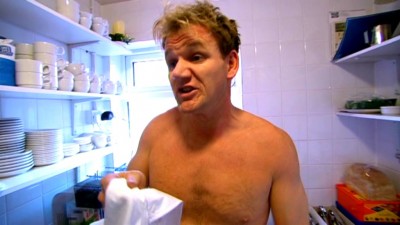
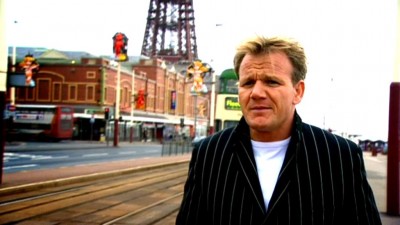
The DVD:
The Video:
The anamorphically enhanced, 1.78:1 widescreen video transfers for Ramsay's Kitchen Nightmares - Complete Series Two look extremely sharp, with reasonably good color values and no screen anomalies. I didn't detect any possible PAL conversion problems, although interlacing, albeit discreet, was discernable. Overall, quite a nice image.
The Audio:
The Dolby Digital English 2.0 stereo mix for Ramsay's Kitchen Nightmares - Complete Series Two is super-clean, delivering crisp dialogue and surprisingly delineated spatial effects when the pots and pans start clanging around the kitchens.
The Extras:
Only a text bio for Ramsay distinguishes this release (the first release had some text production notes. I think Acorn can do better than this.
Final Thoughts:
It's tough to say if Gordon Ramsay is going to implode due to all the recent scandals and setbacks in his personal and professional life (I tend to doubt it; he looks like a fighter). But watching these Kitchen Nightmares knowing Gordon may be guilty of some of the culinary sins he routinely rails against does affect how you view these earlier episodes. Still, it's a hell of an entertaining show, with eye-opening looks at the behind-the-scenes operations of restaurants (advice from a confirmed germaphobe: you'd be crazy to eat out after seeing this), and Gordon is hilarious. I highly recommend Ramsay's Kitchen Nightmares: Complete Series Two.
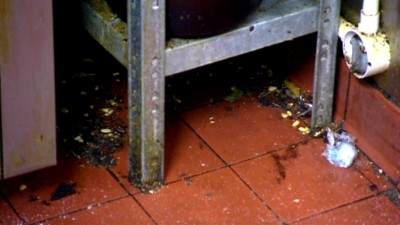
Paul Mavis is an internationally published film and television historian, a member of the Online Film Critics Society, and the author of The Espionage Filmography.


|
| Popular Reviews |
| Sponsored Links |
|
|
| Sponsored Links |
|
|
| Release List | Reviews | Shop | Newsletter | Forum | DVD Giveaways | Blu-Ray | Advertise |
|
Copyright 2024 DVDTalk.com All Rights Reserved. Legal Info, Privacy Policy, Terms of Use,
Manage Preferences,
Your Privacy Choices | |||||||









